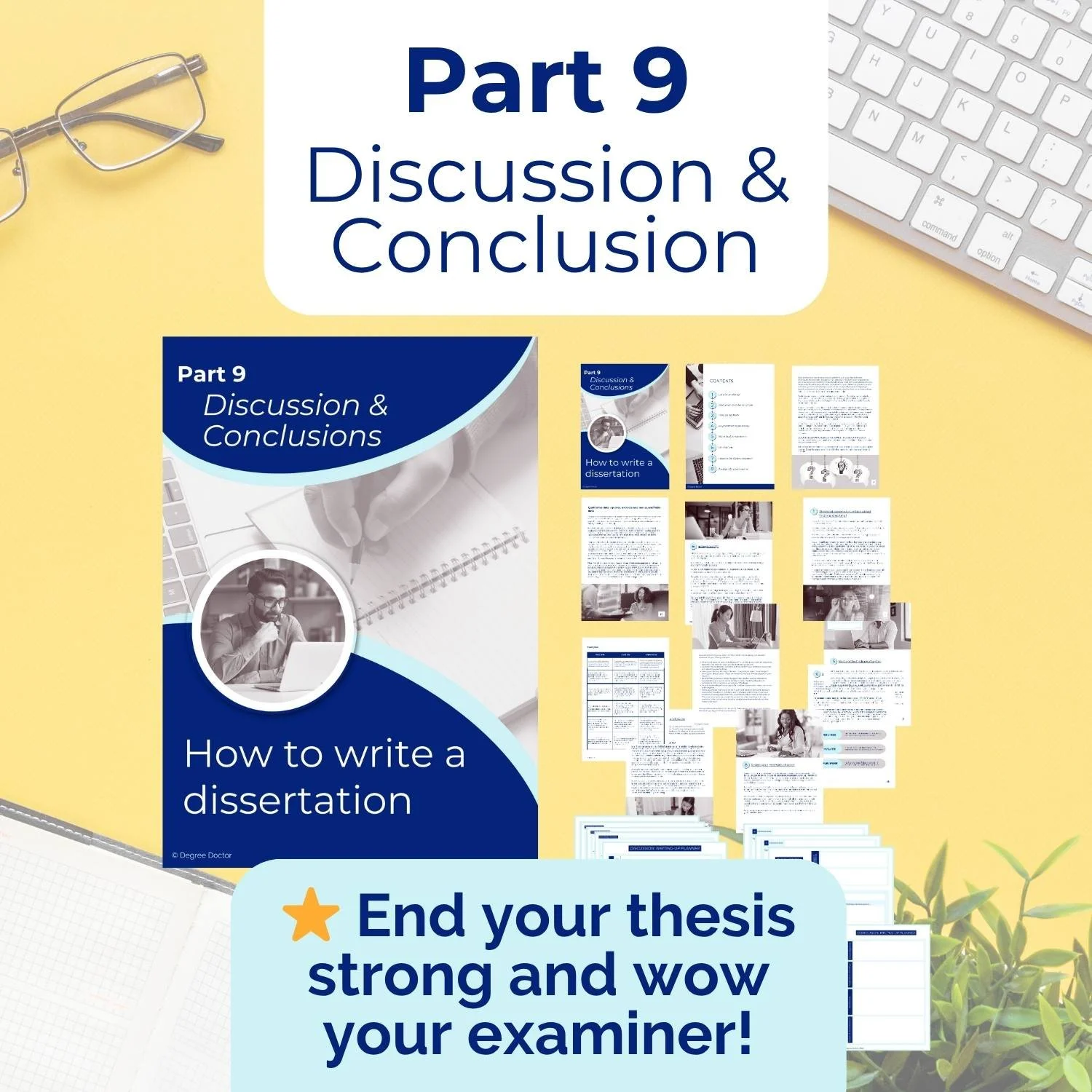How to write your PhD thesis discussion and conclusion chapters
The PhD discussion and conclusion chapters, urgh! By this stage in your journey, you’re probably feeling, how shall I say it, a little fatigued, right?!
But, it’s super important you finish strong!
The discussion and conclusions are the last things your examiner will read, so you need to leave them with a good impression.
Finishing up your PhD dissertation is a huge deal, and you might be scratching your head over the discussion and conclusion chapters. Don't worry, I’m here to clear things up and help you nail these crucial parts of your research.
Understanding the Discussion Chapter
The discussion chapter in your PhD dissertation is where you really dive into what your research means.
Instead of just repeating your findings, you'll explore their significance.
Let's say your study looks at how money affects students' success in school.
You'd consider the implications of your findings regarding the intricate relationship between money and education. Here, you wouldn't just restate your results, but rather, you'd interpret them in the context of existing knowledge and theories.
For instance, if your research indicates that students from low-income backgrounds face significant barriers to academic achievement due to limited access to resources, you'd explore how this aligns with previous studies and societal understandings of socioeconomic disparities in education. You might discuss how your findings reinforce the notion that financial resources play a crucial role in shaping educational outcomes, shedding light on the persistent inequalities present within the education system.
Furthermore, you'd examine any nuances or complexities within your findings that add depth to our understanding of the money-education connection. Perhaps your research uncovers that financial support alone isn't enough to guarantee academic success, and that other factors such as parental involvement or school resources also play a significant role. By highlighting these nuances, you contribute to a more nuanced understanding of the multifaceted relationship between money and education.
Moreover, you might consider the implications of your findings for educational policy and practice. If your research suggests that targeted interventions, such as financial aid programs or mentoring initiatives, can mitigate the negative impact of financial constraints on student achievement, you'd discuss how these insights could inform policy decisions aimed at promoting educational equity and inclusion.
Overall, the discussion chapter provides a platform for you to critically analyse your findings within the broader context of existing knowledge, theories, and societal implications. By doing so, you enrich the scholarly conversation surrounding the complex interplay between money and education, ultimately advancing our collective understanding of this critical issue.
In the discussion chapter, it's also crucial to recognise any limitations in your study. For example, while our example research highlights the impact of financial constraints on student achievement, we might acknowledge that our sample size was limited to a specific geographic area and may not fully represent the diversity of experiences nationwide. Additionally, perhaps our study relied on self-reported data, which could introduce biases. By openly addressing these limitations, we provide a more nuanced understanding of our findings and offer insights for future researchers to explore further.
Crafting the Conclusion Chapter
Now, onto the conclusion chapter. This is the part where you tie everything together and take a step back to see the bigger picture. It's like the grand finale of your dissertation journey, where you reflect on the most significant insights gained from your research.
Returning to our example of how money impacts students' academic success, your conclusion serves as the platform to underscore the importance of your findings.
If your study demonstrates that financial resources significantly influence educational outcomes, your conclusion would emphasise why this matters for schools and policymakers.
For instance, you might discuss how understanding the link between money and academic achievement can inform educational policies and interventions aimed at addressing socioeconomic disparities in schools. By highlighting the practical implications of your research, you emphasise its relevance and potential impact on educational practices and policies.
But your conclusion doesn't stop there. It's also the place to ponder what comes next. Maybe your research raises new questions that demand further exploration. For example, you might wonder how different forms of financial support, such as scholarships or school funding, impact student success differently. Or perhaps your findings suggest changes that could be implemented to support students from low-income backgrounds in their academic endeavors.
In your conclusion, you'll lay out these ideas for future research or action, providing a roadmap for scholars and policymakers to build upon your work. By identifying areas for further investigation or potential policy interventions, you ensure that your research contributes to ongoing efforts to improve educational equity and opportunity for all students.
In essence, the conclusion chapter is your chance to reflect on the significance of your research and chart the course for future inquiry and action. It's where you bring your dissertation journey to a close, leaving a lasting impression on your readers and inspiring further exploration in your field.
Bringing It All Together
So, in a nutshell, the discussion and conclusion chapters of your PhD dissertation are all about making sense of your research and thinking about what it means for the big picture. The discussion chapter digs into the details of your findings and how you got them. The conclusion chapter zooms out to look at the broader implications and what comes next.
As you tackle these chapters, remember to keep things clear and straightforward. Take the time to really think about what your research means and why it matters. By doing that, you'll make sure your dissertation leaves a lasting impression and sets the stage for future research in your field.
Need more guidance on your discussion and conclusions chapters?
Then check out my PhD Survival Guide on these chapters! Details below!
